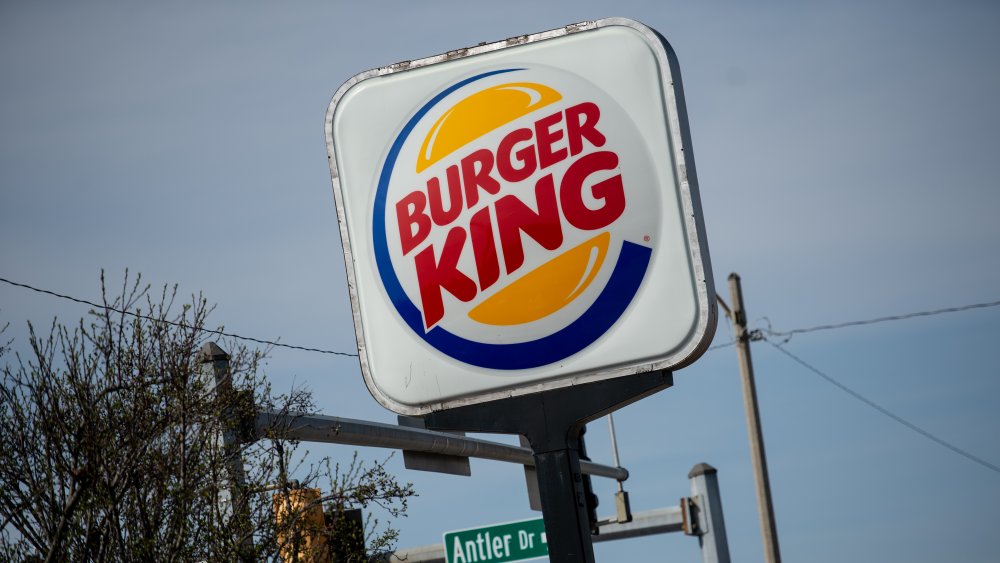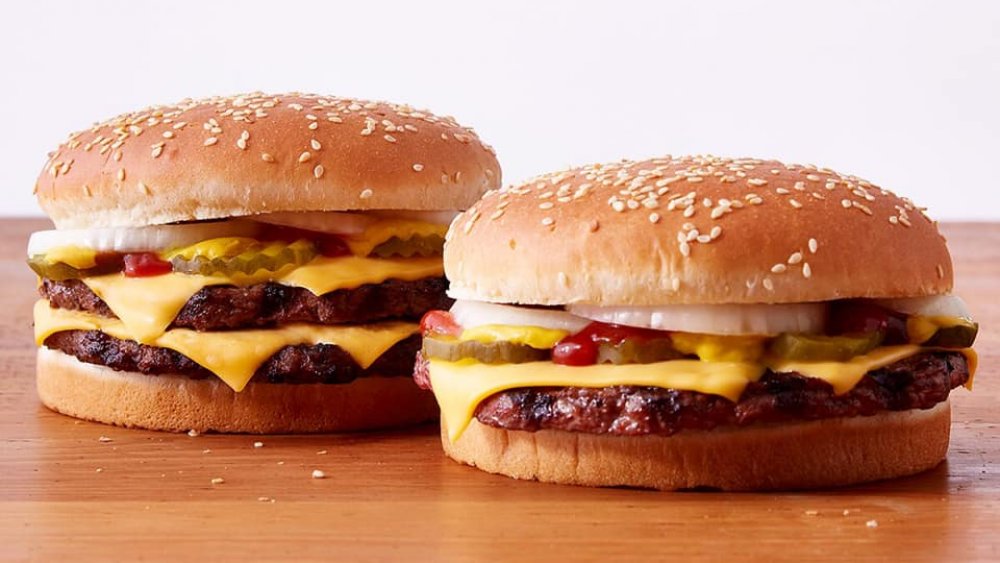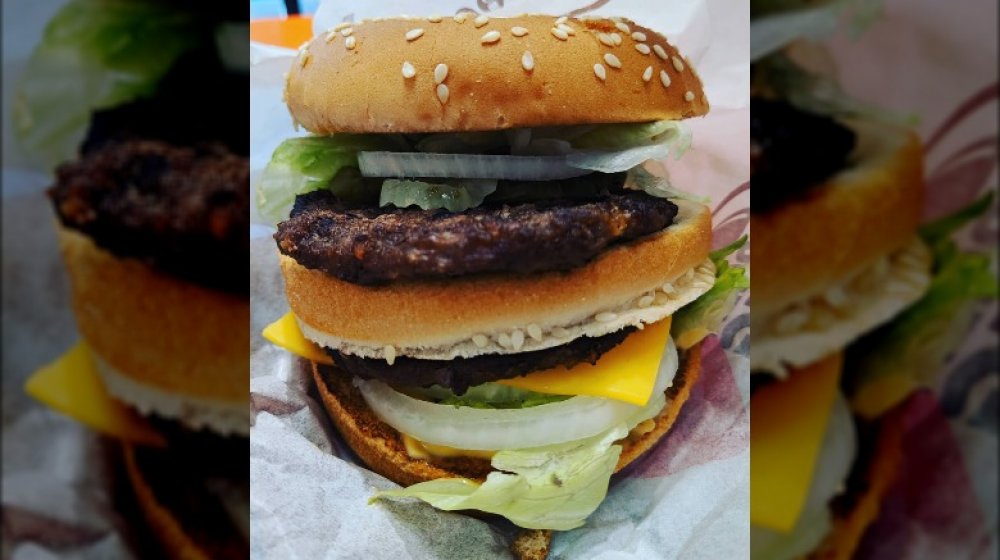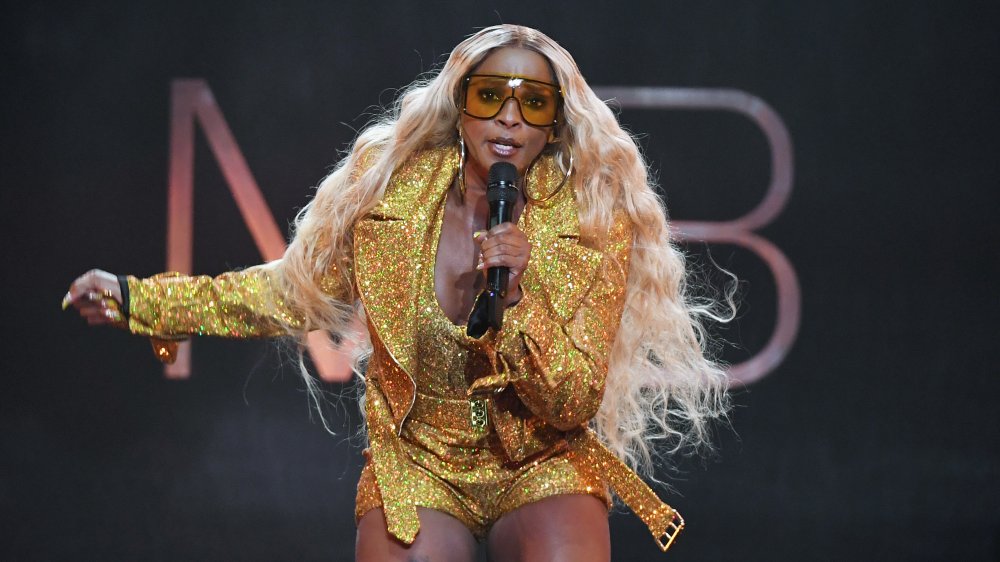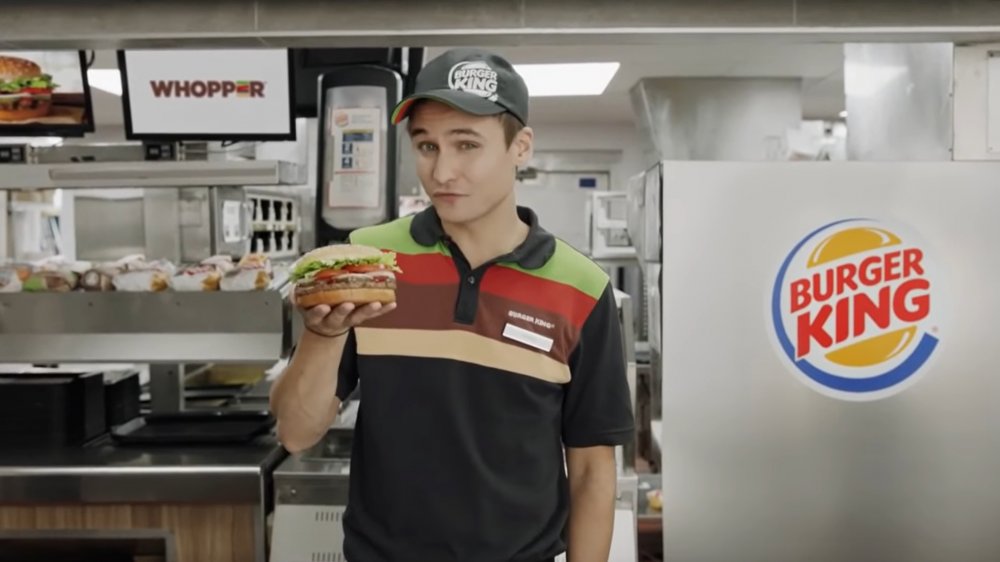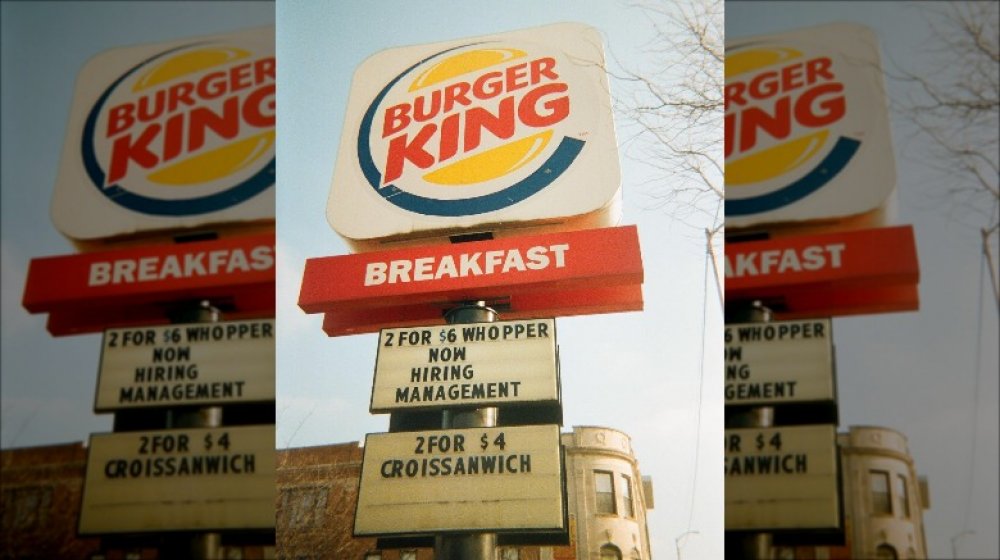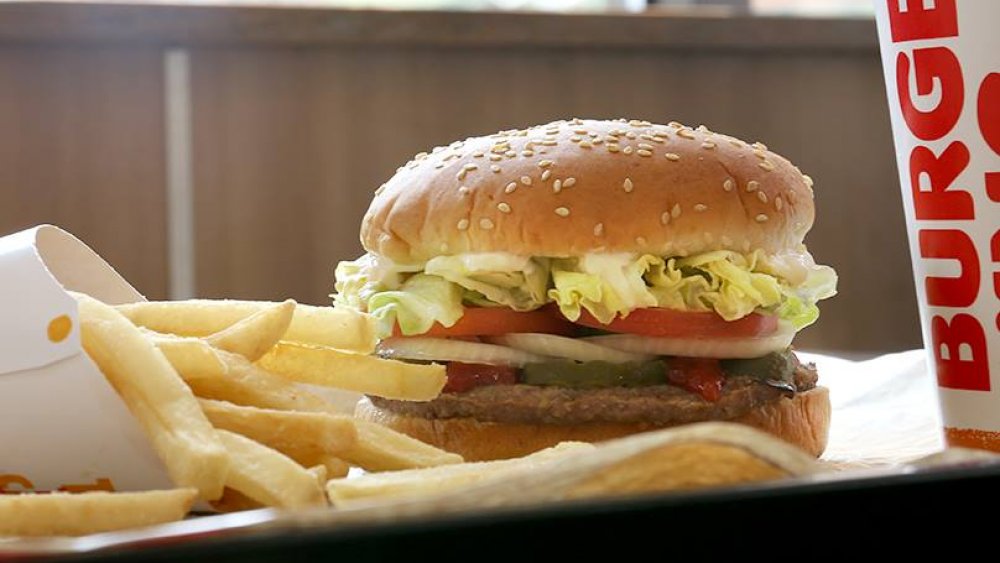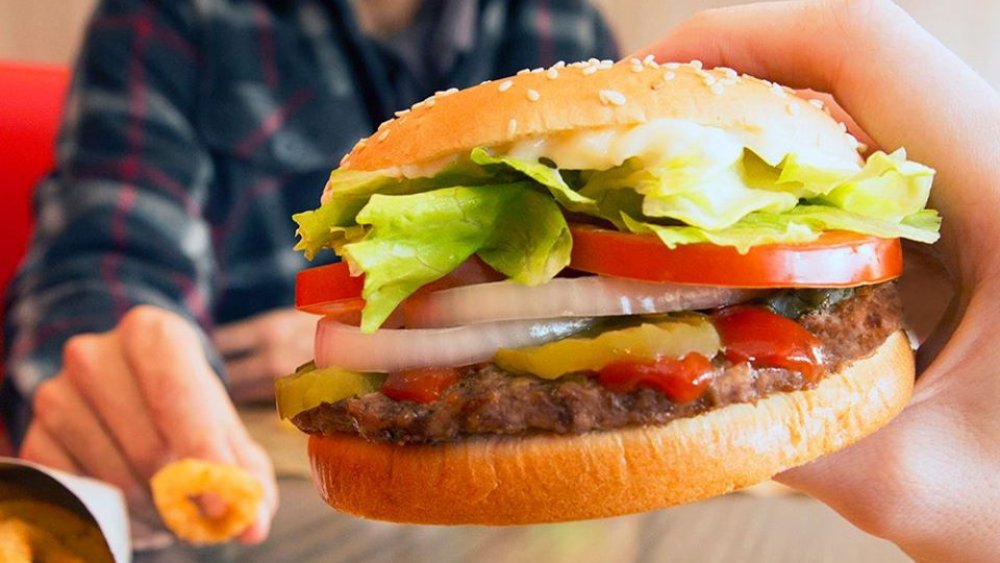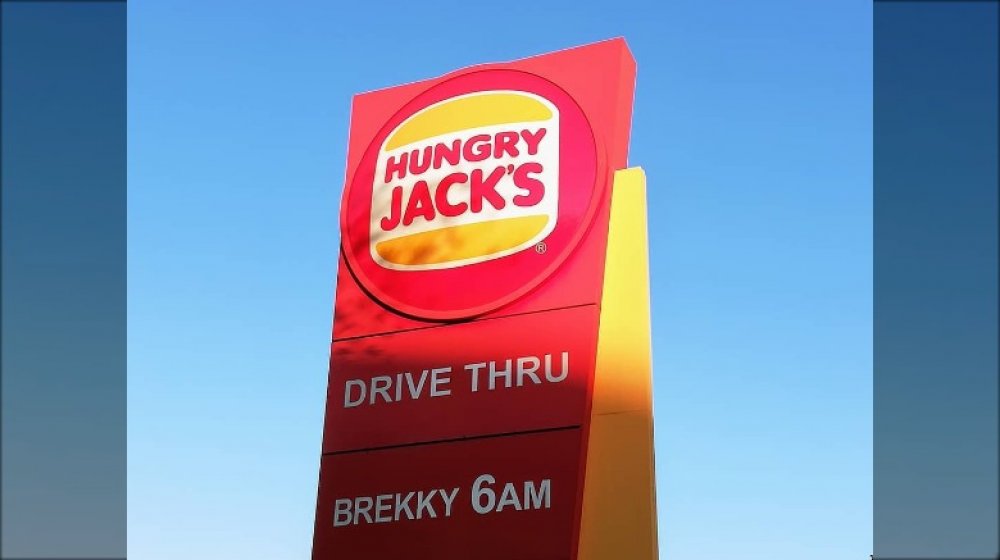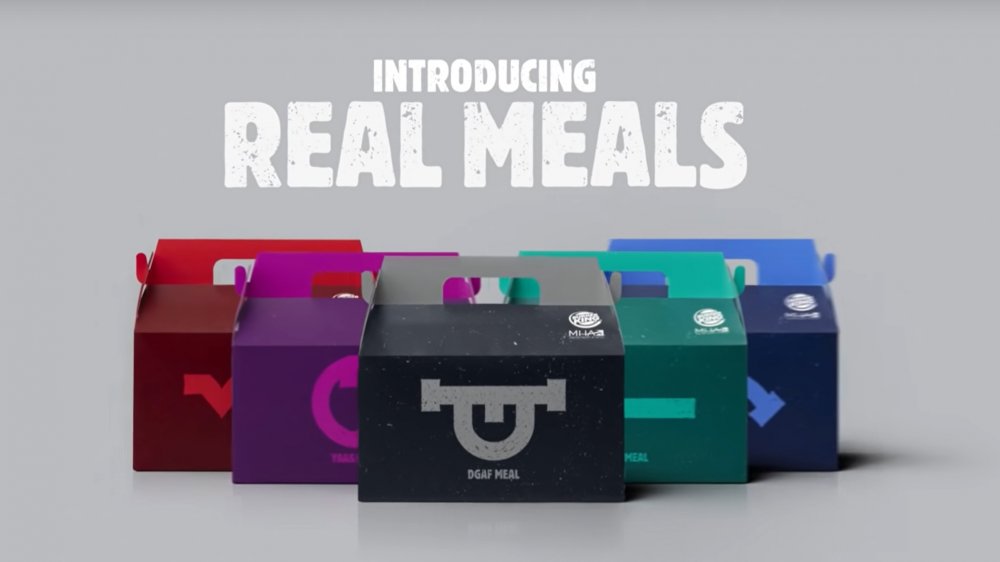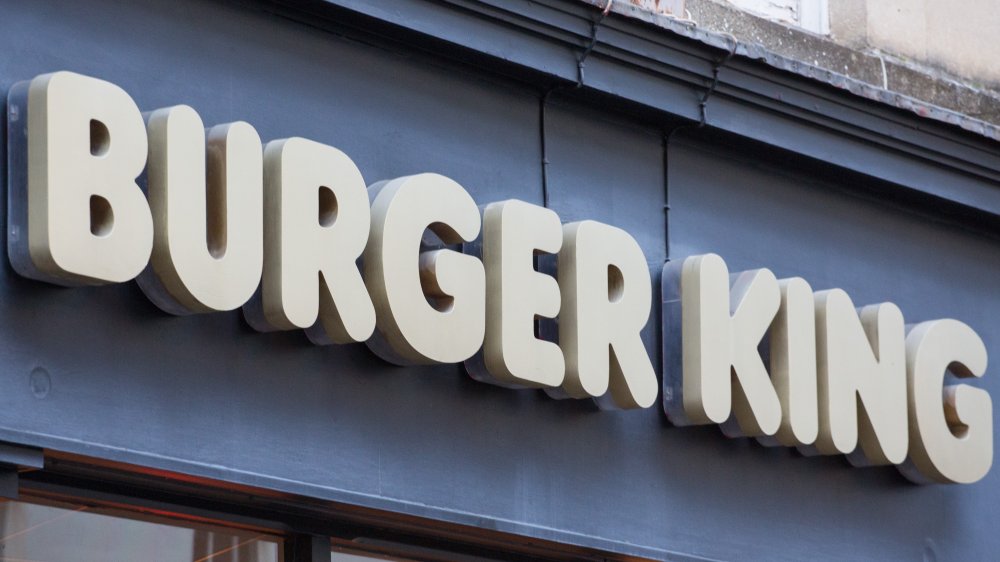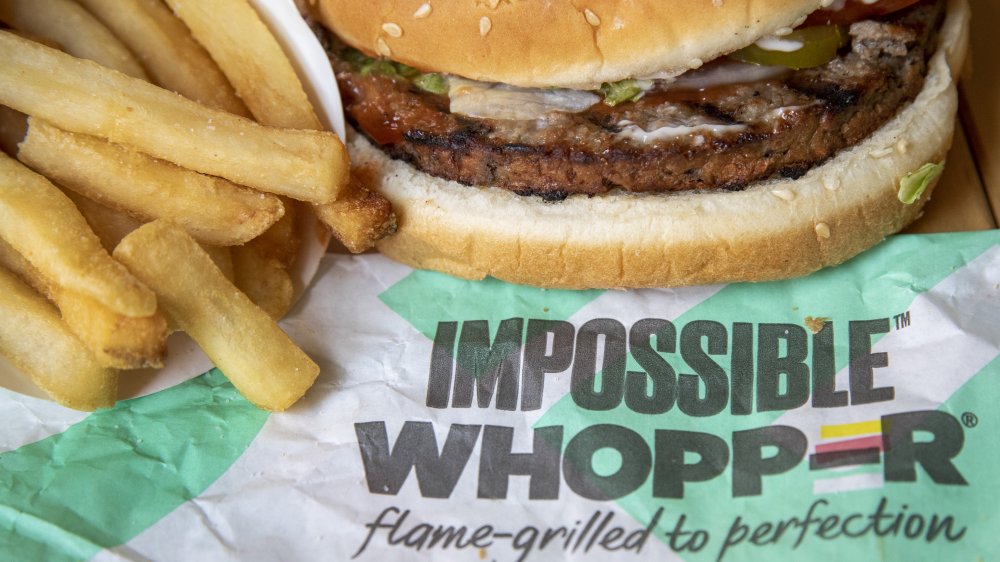Scandals That Burger King Can Never Live Down
What do you think of when you think of fast food burgers? Okay, no, forget it. We don't mean them. Let's try again. What do you think of when you think of other fast food burgers? That's right, Burger King!
Although Burger King may not have achieved the dystopian hyper-dominance of its golden-arched big brother, there's no doubt that the chain easily ranks among the most prolific and successful fast food restaurants of all time. (In case you're wondering, if you ask QSR they're actually seventh.)
Inevitably, however, success breeds scandal — and, just like McDonald's has dealt with a few scandals, Burger King is no stranger to a little controversy. Over the 65 or so years since the company was founded, Burger King has been subjected to a whole host of scandals, some of which posed far more of a problem for the company than others. From tainted meat, to sneaky ads, to social media catastrophes, here are some of the scandals that Burger King will never be able to live down.
Burger King may have served horse meat
Back at the beginning of 2013, the U.K. food industry was embroiled in a nationwide scandal after it was revealed that certain foods, advertised as containing beef, contained traces of horse meat. The source of the contamination was believed to be a supplier used by the Silvercrest Foods plant, an Irish meat factory — and it got so bad that one burger from British supermarket Tesco was found to contain 29 percent horse. Silvercrest supplied meat to a number of different U.K.-based companies, including Aldi, Asda, Tesco, the Co-op, and, as it turned out, Burger King.
At the end of January 2013, the company revealed that some of its burgers had indeed been contaminated. "Our independent DNA test results on product taken from restaurants were negative for any equine DNA," Burger King said in a statement. "However, four samples recently taken from the Silvercrest plant have shown the presence of very small trace levels of equine DNA."
According to the company, they took immediate action once the contamination was discovered. In the statement, Burger King explained: "Within the last 36 hours, we have established that Silvercrest used a small percentage of beef imported from a non-approved supplier in Poland. They promised to deliver 100 percent British and Irish beef patties and have not done so. This is a clear violation of our specifications, and we have terminated our relationship with them."
Still... not a good look, is it?
Burger King tried to copy the Big Mac
If you'll forgive the expression, it's probably fair to say that the Big Mac is the undisputed king of the burger world. It's the McDonald's ace in the hole; their finest and most enduring creation. So maybe it's not that surprising that Burger King once tried to rip it off.
Say hello to the Big King. It's actually the second attempt at flattery Burger King pulled off against the Big Mac, since they released the Double Supreme back in 1993. After a difficult start, however, it was rebranded as the Big King in 1996. It was discontinued shortly after, which isn't much of a surprise considering you could get pretty much the exact same thing from the McDonald's down the street.
The Big King returned to stores in 2013. According to Serious Eats, it was practically identical to the Big Mac in composition: three layers of bun, patties, cheese, onion, pickles and a special sauce. But there was a difference in flavor — the Big King's sauce was overwhelmingly sweet while the char-broiled patties tasted "strongly like fake smoke," while the meat was "gristly and dry." While the Big Mac is by no means a quality burger, they added, the Big King came off as little more than a "weird farce."
And they weren't the only ones to make the comparison. Publication after publication framed the Big King as a Big Mac rip-off, and not too many people sang the imitator's praises. Not a huge success, then.
Burger King's Mary J. Blige commercial ruffled some feathers
In April 2012, a Burger King commercial starring legendary singer Mary J. Blige leaked to the internet. The commercial featured Blige singing about Burger King's fried chicken wrap to the tune of her song "Don't Mind." Which, yeah — yikes. Predictably, the ad attracted a whole heap of criticism for "playing into African-American stereotypes," and Burger King immediately pulled the ad. They quickly offered an apology to Mary J. Blige in a statement issued by the company:
"We would like to apologize to Mary J. and all of her fans for airing an ad that was not final. We know how important Mary J. is to her fans, and we are currently in the process of finalizing the commercial. We hope to have the final ad on the air soon."
Blige then publicly opened up about the commercial, admitting that her "heart dropped down to [her] stomach" when she first saw it. "I got this sweat and I said, real calm, 'This too shall pass.'" she explained during an appearance on Hot 97's Angie Martinez show. "But it just kept getting worse and worse and worse [...] I went online to listen to the remix I did with Fat Joe, and all I can see is 'Burger King' and 'chicken' and 'buffoonery.' It just broke my heart."
Blige claimed she had originally been told the ad would be part of a "fun and creative" campaign, but argued it was shot in an entirely different way than what she had expected.
Burger King's OK Google ad was seriously creepy
Another controversy arose from one of Burger King's advertising campaigns in 2017 when the company released a TV commercial that, depending on who you asked, was either deeply insidious or absolute genius.
The ad featured a Burger King employee standing behind the counter. "You're watching a 15 second Burger King ad," he says, "which is unfortunately not enough time to explain all the fresh ingredients in the Whopper sandwich. But I got an idea. OK Google, what is the Whopper burger?"
The idea is that viewers' Google Home devices, hearing the ad, would then read out the Whopper's Wikipedia page. Aside from the fact that a commercial controlling a device inside your home is seriously creepy, problems arose for Burger King when it became clear that Google had not been consulted about the ad. Shortly after the ad was released, Google inserted a block into the software that prevented the commercial from working.
Then again, it wasn't all bad for the fast food chain: later that year, it won a marketing award for the stunt at the Cannes Lions, the advertising industry's biggest annual event. One jury member described the commercial as "the best abuse of technology."
Burger King's Croissan'wich deal wasn't much of a deal
In case you've never encountered one before, the Burger King Croissan'wich is, well, kind of a combination of a croissant and a sandwich. It usually contains sausage, bacon, or ham, with eggs and cheese, sandwiched between a croissant. And despite being an enduring breakfast item for the company, it courted controversy back in 2017 when customers noticed they'd been charged too much for them.
More specifically, a Burger King customer named Koleta Anderson, who had purchased a Croissan'wich on a 2-for-1 deal, filed a class-action suit against the company alleging that BK had inflated prices on the item for customers who utilized the deal. Basically, if you bought yourself two Croissan'wiches with a BOGO coupon, you ended up paying more money than you would have if you bought one without the coupon — meaning the company essentially lied about the deal. Anderson herself had been charged $3.19 for two sandwiches under the BOGO deal, but was later charged $2.16 for just the one. The same thing happened at multiple Burger King stores.
The dispute went to court and, while the court didn't rule that any party was in the right, Burger King quickly settled and agreed to pay any affected customer $5 — or a $2 gift card.
Burger King's Whopper Sacrifice campaign was pretty brutal
Oh yes, it's another ad. This time, controversy swirled around Burger King's "Whopper Sacrifice" campaign, which offered Facebook users a free Whopper if they'd delete 10 friends from their Facebook pages. And the kicker? The app would then message each of those 10 friends, telling them that your friendship to them was worth only 1/10th of the price of a hamburger. Which, in fairness, is downright genius. Pure, horrible, evil genius.
Obviously, the campaign was hugely successful. It was installed 60,000 times in just a few days. Almost 20,000 coupons were given out and well over 200,000 people were deleted as friends. As far as ad campaigns went, it couldn't have gone much better. Unfortunately, Facebook then decided to step in. The company disabled the Whopper Sacrifice app, claiming that it was a violation of user privacy because of the message that was sent to each unfriended user.
Matt Walsh, head of the Interaction Design department at the agency that created the ad, later told a Web Expo: "Some people thought it was a little brutal."
Yeah, just a little.
Burger King in Russia asked women to get pregnant
Honestly, you'd think someone at Burger King head office was intentionally sabotaging the company, what with all these damaging ads that they keep releasing. This next marketing calamity came in mid-2018, when the company began a campaign that offered a free lifetime supply of Whoppers to any Russian women who got pregnant by players in the 2018 World Cup.
On a post from their Russian-language Twitter page, the company promised their reward (which included 3 million roubles, or $64,000) to the women who get "the best football genes" and "ensure the success of the Russian team for generations to come."
Predictably, people got kinda mad about this. After a flurry of criticism, which denounced the ad as misogynistic and humiliating, Burger King was forced to issue an apology. "We are sorry about the clearly offensive promotion that the team in Russia launched online," the company said. "[The offer] does not reflect our brand or our values and we are taking steps to ensure this type of activity does not happen again."
Burger King took on Hungry Jack's (and lost)
In 1971, a Canadian businessman named Jack Cowin opened Burger King's first franchise in Australia. Unfortunately, because the Burger King name was already trademarked in Australia, Cowin was forced to call his store Hungry Jack's instead, a name he had lifted from a popular brand of pancake-mix.
Within the decade, Hungry Jack's had opened 26 restaurants across three states in Australia, making Cowin one of the heavy-hitters of the Australian fast food industry. Unfortunately, Burger King quickly became uncomfortable with Cowin's success, and the relationship between the two parties began to deteriorate.
In 1993, Burger King purchased four Hungry Jack's stores from one of their other franchisees and rebranded them under the Burger King name, which by this point the company had gotten permission to use. Burger King next tried (and failed) to terminate their franchising agreement with Cowin, before attempting to stamp him out by mass-opening their own restaurants in Australia.
Cowin, however, took action to stop this. He sued Burger King, eventually winning a $45 million court judgement. In 2003, Burger King gave up, announced it was ending its relationship with Cowin, and subsequently gave up their share of the Australian market to the businessman.
As of 2017, Cowin was worth nearly $2 billion, owned over 400 Hungry Jack's, was chairman of Domino's in Australia, and owned a number of KFCs across the country. His war against Burger King was a classic David vs. Goliath story, that's for sure — we're just not sure who was who.
Some found Burger King's Real Meals offensive
Everyone's heard of a Happy Meal, but how about a Real Meal? Well, that's what Burger King started hocking in early 2019 as part of their never-ending war against McDonald's.
The company launched a mental health awareness campaign in which they offered a range of "Real Meals", including the Blue Meal, Salty Meal, Yaaas Meal, and DGAF Meal. Their tie-in video ad used the tagline: "No one is happy all the time. And that's OK."
While some people gave credit to Burger King for attempting to raise awareness of mental health issues, others were considerably less impressed by the Real Meals, claiming that the company was attempting to profit off the delicate subject.
"First, good on @BurgerKing for attempting to start a conversation about mental health," wrote one Twitter user. "But... Using 'mental health awareness' as a gimmick to market food and get in a dig at @McDonalds seems incredibly un-'real'." Another user tweeted: "I'm so happy that Buger [sic] King cares enough about my mental health to use is as a way to advertise their burgers."
Some mental health experts disagreed, however. "This is the way they communicate and talk," said Tiffany Huth of the Association for Behavioral Health and Wellness. "You have to speak to people in a way they understand and in a way they feel comfortable and safe, and in a way they can relate to."
Still, if nothing else it seems apparent that, even today, Burger King is incapable of running a marketing campaign without pissing someone off.
A Burger King ad was said to have mocked Asians
Despite being targeted at New Zealand audiences, this particular ad campaign stirred up controversy as far away as China. The ad itself, which was posted to a Burger King franchise's Instagram account, showed Westerners attempting to eat Burger King's new "Vietnamese Sweet Chilli Tendercrisp Burger" with oversized chopsticks.
Chinese social media users demanded an apology immediately, claiming the company had mocked Asian dining etiquette. For its part, Burger King had the video deleted swiftly and soon after issued an apology. "The ad in question is insensitive," they said, "and does not reflect our brand values regarding diversity and inclusion."
Some online users admitted they weren't sure "if this is truly racial discrimination," even if "the people who made they ad really do not have brains." Nonetheless, a hashtag that translated to "Burger King apology" was viewed over 50 million times on Chinese social media site Sina Weibo in just a few days after the controversy began.
Burger King's tweet seemed to encourage violence
Earlier in 2019, a trend appeared in the United Kingdom and the United States in which protestors and activists would throw milkshakes at certain right-wing figures. In the U.K., this happened to both the far-right agitator Stephen Yaxley-Lennon (otherwise known as Tommy Robinson), as well as Brexit Party leader Nigel Farage.
Although these tactics were controversial enough without the input of an international burger company, Burger King decided to wade in nonetheless. After a branch of McDonald's gave in to a police request to stop selling milkshakes and ice cream on the day of a Nigel Farage rally in Edinburgh, Burger King took to Twitter to post: ""Dear people of Scotland. We're selling milkshakes all weekend. Have fun. Love BK. #justsaying"
According to the Advertising Standards Authority, 24 people complained about the tweet, arguing that it encouraged violence against political figures. Burger King actually stood its ground this time, insisting that the tweet was intended to be tongue-in-cheek and posting a follow-up tweet that read: "We'd never endorse violence — or wasting our delicious milkshakes."
Make of that what you will.
Burger King's Impossible Whopper was not what we thought
This last controversy arose in 2019, when Burger King launched their version of the Impossible Burger: a traditional Burger King burger featuring a zero percent beef patty. Initially, this may seem pretty admirable, since it represents a sincere attempt by the company to offer a fully meatless "meat" product — something not done much by fast food chains until recently.
Unfortunately, Impossible Foods (who provide the "meat" for these products) and their competitor Beyond Meat quickly came into some serious criticism from a number of different groups. The CEOs of both Whole Foods and Chipotle criticized the companies for making their fake meat too highly processed, while a range of articles by a variety of publications have questioned the potential health impact of their products. As Vox writes, the Impossible Whopper is "high calorie, greasy, and probably not a good idea to eat everyday."
All that controversy, though, was nothing compared to when the public learned that the Impossible Whopper wasn't really vegan — or even vegetarian — due to the fact that it's cooked on the same grill as real meat. Of course, Burger King never claimed that it was, but that didn't stop the meat-free portion of the public from feeling a bit tricked.
